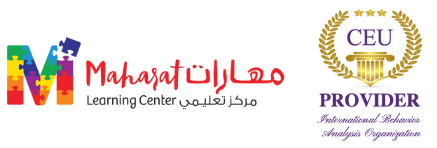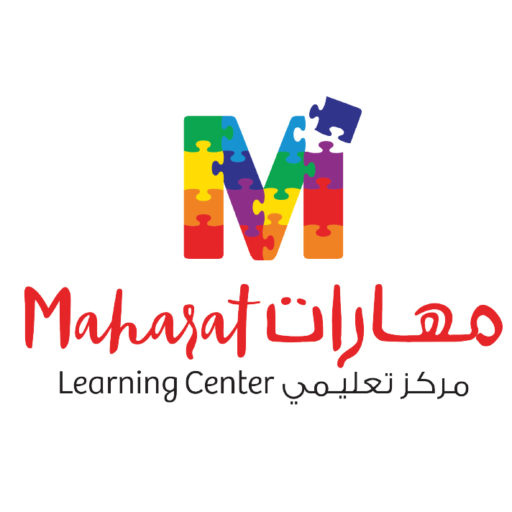
Only through continuous learning can we hope to maintain the highest level of professional excellence, meeting the needs of our clients as caregivers. It is recognized that the success of our organization depends on all staff, whatever their role, having the relevant skills, knowledge, and competencies. The Maharat Professional Development Center recognizes that professional development is fundamental to its success.
We provide a variety of professional training for teachers, school shadows, learning support assistant and behavioral therapists to ensure the successful inclusion of our children. Training can be requested at your venue or at our location. Our professional courses include Registered Behavioral Technician RBT, Learning Support Training course, Inclusive Education for teachers, advanced Behavioral therapy training.
Training Programs
1. Basic Applied Behavioral Analysis for Parents
Applied Behavioral Analysis (ABA) is a systemic treatment for Autism Spectrum Disorders (ASDs) based on scientific research. It is used to teach functional and relevant skills to give young children with ASDs the tools they need to learn to succeed. Behavior analysis focuses on the principles that explain how learning takes place. Positive reinforcement is one such principle. When a behavior is followed by some sort of reward, the behavior is more likely to be repeated. Through decades of research, the field of behavior analysis has developed many techniques for increasing useful behaviors and reducing those that may cause harm or interfere with learning.
Applied behavior analysis (ABA) is the use of these techniques and principles to bring about meaningful and positive behavioral change. It is most commonly used with the treatment for Autism Spectrum Disorders (ASDs) but it can also be used to teach any functional skills, including school related skills.
2. Healthy Diet & Nutrition for Children
- Why health begins in the gut.
- Which foods are the most harmful to the gut and should be removed.
- How do we remove them.We will go through a number of foods available in supermarkets and learn how to read food labels.
- What are the substitutes
- Five traditional foods that have gut healing properties. What are they? How to prepare them and present them to your child.
3. Understanding and Managing Challenging Behaviors
Individuals with Autism Spectrum Disorder and other Developmental Disabilities often display challenging behaviors that may cause harm to themselves and/or others. Those working with these individuals have an ethical obligation to protect the safety of the individuals displaying the challenging behaviors and everyone in their environment. Safety should be protected in a dignified, scientifically-researched, and effective manner. We will discuss and practice some effective crisis management techniques. It is important to work within a competency-based crisis management system, structured to ensure successful prevention and intervention with an emphasis on safety, dignity and effectiveness.
4. Parent Guide to Social Communication Skills
- The participants will learn about the Pragmatic language which involves 3 specific communication skills:
- 1) Using language;
- 2) Changing language and
- 3) following rules.
- Although these communication skills may sound simple on the surface, they are quite complex and confusin.especially because these rules vary within and across cultures.
5. Principles of Toilet Training
Toilet Training It is often indicated that children with developmental disabilities generally show the same signs of ‘toileting readiness’ as that of typically developing children; however, these signs often appear when the child is older and the training might take longer. Surprisingly, the actual steps for preparing the individual for toilet training are also similar for all children, with the exception that individuals with developmental disabilities might need alternative strategies adjusted to suit their needs and/or additional instruction. Regardless, it is necessary to recognize that toilet training is largely about cooperation, communication and working together with the individual being toilet trained.
Learning Objectives
- Identify signs the individual is ready for toilet training
- Discuss the preparation for toilet training
- Discuss various types of toilet training strategies
- Discuss supplemental supports to facilitate success
6. Principles of Feeding Therapy
The training utilizes the principles of Applied Behavior Analysis (ABA) to increase behaviors related to food acceptance and decrease behaviors related to food refusal. Feeding Therapy is used as an intervention to help children acquire the skills for successful eating. Parent training is an important part of Feeding Therapy in order for the parent(s) to continue to support the child after therapy finishes.
Feeding problems and difficulties:
- Food refusal
- Food selectivity and rigidity
- Food texture sensitivities
- Rapid eating
- Forced vomiting
- Rumination (the repeated regurgitation and re-chewing of partially digested food)
- Behavioral issues
- Self-feeding
- Generalize eating behaviors across locations

Parent Training
At Maharat, we understand the difficulties that parents and families with children of determination face every day. That is why we offer parents specialized training programs that empower parents by giving them the tools and strategies they need to help their children lead happy and fulfilling lives.
Our Programs
Basic Applied Behavioral Analysis for Parents
Applied Behavioral Analysis (ABA) is a systemic treatment for Autism Spectrum Disorders (ASDs) based on scientific research. It is used to teach functional and relevant skills to give young children with ASDs the tools they need to learn to succeed. Behavior analysis focuses on the principles that explain how learning takes place. Positive reinforcement is one such principle. When a behavior is followed by some sort of reward, the behavior is more likely to be repeated. Through decades of research, the field of behavior analysis has developed many techniques for increasing useful behaviors and reducing those that may cause harm or interfere with learning.
Applied behavior analysis (ABA) is the use of these techniques and principles to bring about meaningful and positive behavioral change. It is most commonly used with the treatment for Autism Spectrum Disorders (ASDs) but it can also be used to teach any functional skills, including school related skills.
Understanding and managing challenging behaviors
Individuals with Autism Spectrum Disorder and other Developmental Disabilities often display challenging behaviors that may cause harm to themselves and/or others. Those working with these individuals have an ethical obligation to protect the safety of the individuals displaying the challenging behaviors and everyone in their environment. Safety should be protected in a dignified, scientifically-researched, and effective manner.
We will discuss and practice some effective crisis management techniques. It is important to work within a competency-based crisis management system, structured to ensure successful prevention and intervention with an emphasis on safety, dignity and effectiveness.
Building Social Communication skills
The participants will learn about the Pragmatic language which involves 3 specific communication skills:
1) Using language;
2) Changing language and
3) following rules.
Although these communication skills may sound simple on the surface, they are quite complex and confusin.especially because these rules vary within and across cultures.
Guide to Toilet Training
Toilet Training It is often indicated that children with developmental disabilities generally show the same signs of ‘toileting readiness’ as that of typically developing children; however, these signs often appear when the child is older and the training might take longer. Surprisingly, the actual steps for preparing the individual for toilet training are also similar for all children, with the exception that individuals with developmental disabilities might need alternative strategies adjusted to suit their needs and/or additional instruction. Regardless, it is necessary to recognize that toilet training is largely about cooperation, communication and working together with the individual being toilet trained.
Fun with Feeding
The training utilizes the principles of Applied Behavior Analysis (ABA) to increase behaviors related to food acceptance and decrease behaviors related to food refusal. Feeding Therapy is used as an intervention to help children acquire the skills for successful eating. Parent training is an important part of Feeding Therapy in order for the parent(s) to continue to support the child after therapy finishes.







